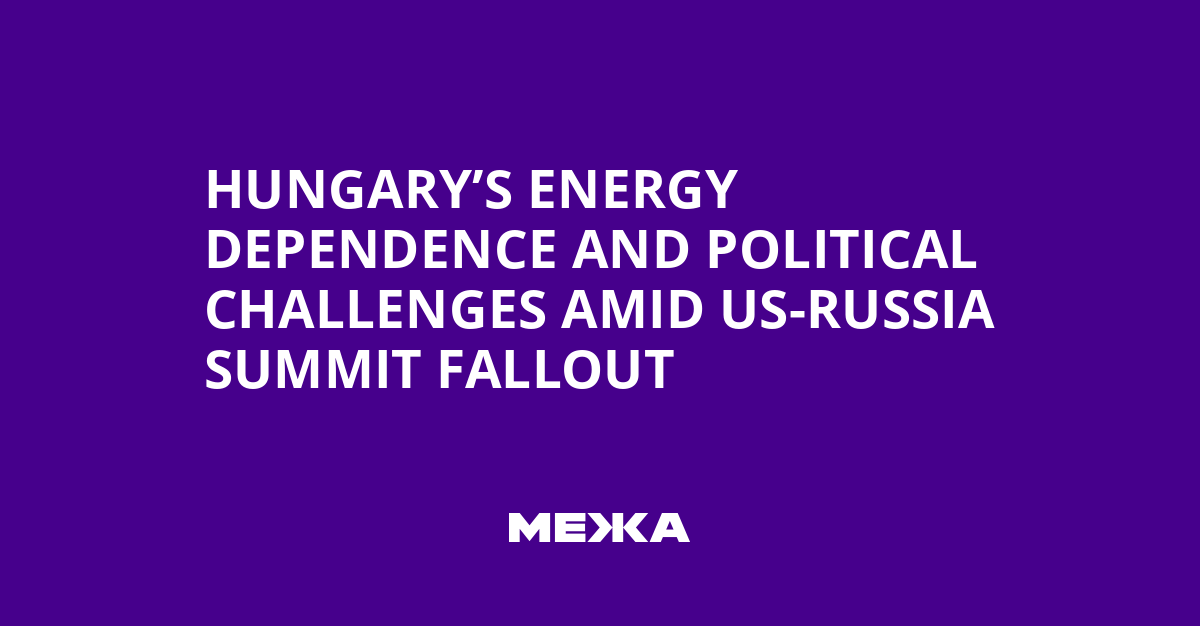Hungary found itself at the center of international attention after it emerged last week that Russia and the United States had chosen the country for a future summit linked to ending the war in Ukraine. The news underscored Budapest’s role as a hub of negotiations between the West and Moscow.
Positioning Hungary as an ally of both Putin and Trump, Viktor Orbán attempted to show the world a path to peace, which, he says, lies through Budapest.
However, his hopes were dashed by the sudden U.S. decision not to hold the summit in the Hungarian capital and the announcement of sanctions against the two largest Russian oil companies – a move that marked the first major step of Trump’s renewed presidency.
The new sanctions are aimed at draining Moscow’s war budget, yet they could also harm Hungary’s economy. Most EU countries have already diversified their energy flows since Russia’s full-scale invasion in 2022, while Hungary and Slovakia remain overly dependent on Russian oil.
Now Orbán is facing the consequences of his own energy policy. Alongside the imposition of U.S. oil sanctions, the EU on Thursday confirmed a ban on imports of Russian liquefied natural gas from 2027. Last month, Orbán assured Trump that without Russian energy imports Hungary’s economy would be “on its knees”.
Despite Brussels’ critique of European unification, Orbán says he defends sovereignty – Hungary’s right to chart its own path within the EU and to seek ties with leaders beyond its borders. Yet such an energy line keeps the country dependent on a single source of supply.
The double blow of U.S. sanctions and the LNG ban comes as Orbán, the longest-serving prime minister in Europe, tries to suppress the growing opposition movement led by Peter Magyar – a former loyal ally of Orbán who has become his main rival. Although Orbán had counted on support during the U.S.–Russia summit in Budapest, he now faces an intensifying economic crisis ahead of important spring elections.
Western Reaction and Prospects for Hungary
Since the full-scale invasion of Ukraine began, the EU has reduced imports of Russian energy, but Hungary, Slovakia, and the Czech Republic received exemptions – a window to reduce dependence on Russia.
Yet two countries used these exemptions to deepen their dependence. In particular, Hungary’s share of Russian oil rose from 61% in 2022 to 86% in 2024; this year’s imports from Russia are around 92%. Slovakia also remains almost fully dependent on supplies from Moscow.
According to a May report, purchases of Russian oil brought the Kremlin about 5.4 billion euros – equivalent to the cost of roughly 1,800 Iskander-M missiles used against Ukrainian infrastructure.
Deliveries flow through the Druzhba pipeline, which has repeatedly come under attack during Kyiv’s strategy to pressure neighbors in the war.
The CSD-CREA report proposes a diversification option of energy supply via the Croatian Adria Pipeline instead of Druzhba, but Orbán has given no signals of a policy shift. In an interview on Hungarian radio, he stated that the government is working on circumventing U.S. sanctions, without providing further details.
“What will the choice be: a friendly meeting between Putin and Trump in Hungary, or the overthrow of Hungary’s government if they try to evade sanctions?”
– Elina Ribakova
According to Ribakova, sanction circumvention could become the first real test of how serious the U.S. administration is about enforcing them.
“Putin’s refusal to end this senseless war”
– Scott Bessent
“We will do this in the future.”
– The President of the United States
Hungary’s economic fate and the resilience of its sanctions policy remain in question: the government’s next steps and public reaction will shape not only domestic dynamics but also influence interstate relations in Central Europe ahead of the most important elections.
